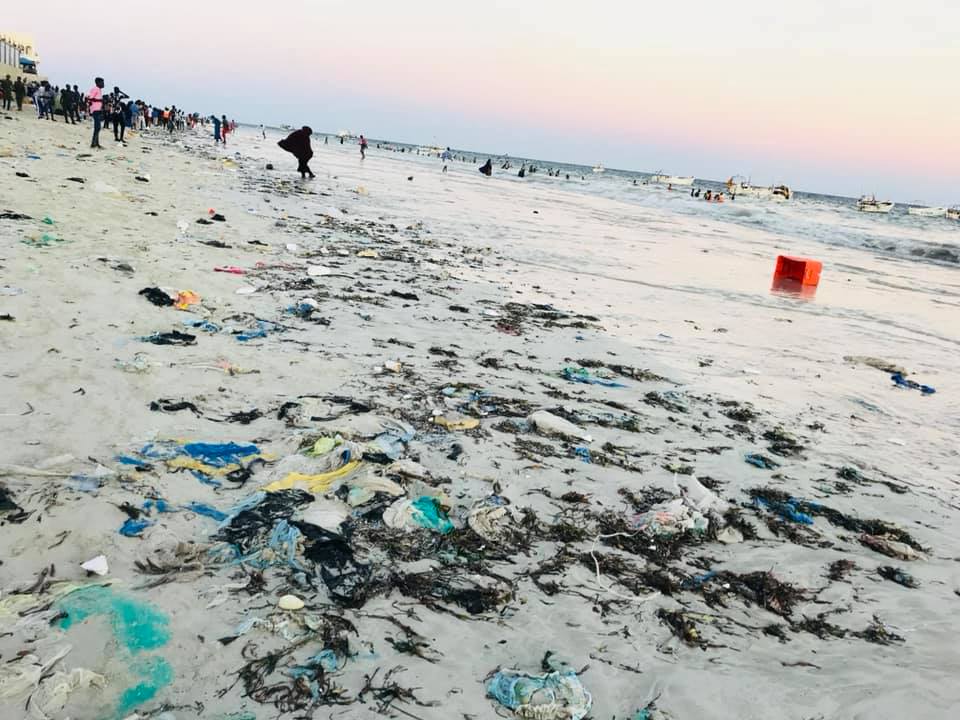
Environmental degradation and lack of protective laws put Somalia's ocean resources at risk
|
11 June 2021 12:57

MOGADISHU (HORN OBSERVER) - Somalia has the longest coastline in mainland Africa with abundant natural resources, but unfortunately environmental activists are concerned about climate change, unsustainable fishing and the absence of laws that protect against environmental degradation put Somalia's ocean resources at risk.
During the World Environment Day commemoration, local activists in Mogadishu said that marine pollution and various wastes dumped into the ocean continue to be a growing problem in Somalia.
"Somalia has extensive marine resources that can be a useful for tackling food insecurity. Unfortunately, these resources are untapped," said Ahmed Nur, a university lecturer on maritime law. "Hazardous waste dumping into the ocean and the impact of environmental degradation are real concerns for us."
Surveys of Somali waters show that there are substantial fish stocks making these waters to be considered as one of the richest fishing grounds in the region.
As activists note, the long, remote coastline of this Horn of Africa nation has been used as a landfill for waste disposal for many years. Secondary evidence shows that illegal waste has been dumped for almost in the past 20 years of lawlessness in the country. There have been persistent reports of illegal, unreported and unregulated fishing and illegal waste dumping to date. Illegal dumping includes radioactive, hazardous and medical waste.
The massive waves that hit northern Somalia after the Tsunami in 2004 are believed to have mobilized tons of nuclear and toxic waste that has been illegally dumped into the country by foreign firms over the years. The major issue is that there is absolutely no waste management system for the country.
Local fishermen have also expressed concern over a dubious fishing deals signed by the Somali government with several foreign companies in recent years, saying it would be difficult to regulate and could lead to overfishing — another challenge to the environment. However, concerns also appear to stem largely from a lack of transparency and communication at the national level, and confusion over the nature of fishing practices.
"Many of these foreign companies are the source of the waste dumping activities. If you look back at what they have done in other parts of Africa you will be shocked. It will be difficult to stop them when they get unlimited access through government contracts," said environmental lawyer Abdirahman Hassan Omar.
His concern matched that of Mogadishu-based fisherman Muridi Aba Sheikh. "We use small nets, and if sea creatures accidentally get caught in our nets, we throw them back into the ocean. These foreign trawlers even catch sea turtles, which they then sell on the black market. They are unscrupulous and they even dump waste they transport from other places without being noticed."
Ecosystem provides a range of life support services that are vital to people's livelihoods, health and economic development, and provide resilience to natural disasters and climate change.
According to activist Nur, many traditional forms of natural resource management and control systems have been abandoned or now ignored. In a few cases this has resulted in clearly unsustainable exploitation, a trend that can be difficult to reverse.
"Many of these natural resources have been directly or indirectly affected by protracted internal conflicts, but competition for access to some resources has also been and continues to be a source of conflict,” he adds.
Conversely, if ecosystem services are disrupted or access is denied, poverty is exacerbated. This deep link between the environment and poverty will likely become increasingly visible as the effects of climate change unfold. Ecosystem services are the benefits people derive from nature, and one of the obvious ecosystem services in Somalia is drinking water.
"If freshwater habitats are destroyed, the beneficial ecosystem services they provide to people are lost as well. This directly affects the livelihoods of many poor women and men who depend on these services," explains Nur.
-
Abdalle Ahmed Mumin is an award-winning freelance journalist. He covers conflict, humanitarian, human rights as well as the impact of climate change. Currently, Abdalle is serving as the secretary general of the Somali Journalists Syndicate (SJS). Follow @Cabdalleaxmed
Leave a comment
- Popular
- Rated
- Commented
04/11/2021 - 11:05:02
28/05/2024 - 15:44:10
02/12/2021 - 11:34:53
01/03/2021 - 09:00:37
Opinions
18/05/2025 - 16:26:37
15/05/2025 - 20:16:04
Politics
05/06/2025 - 13:42:50
Terror Watch
07/06/2025 - 21:36:45
Press Releases
05/06/2025 - 12:21:21
02/06/2025 - 21:29:33
 0
0 




































Environmental degradation and lack of protective laws put Somalia's ocean resources at risk
MOGADISHU (HORN OBSERVER) - Somalia has the longest coastline in mainland Africa with abundant natural resources, but unfortunately environmental activists are concerned about climate change, unsustainable fishing and the absence of laws that protect